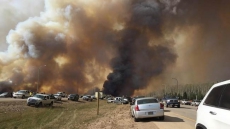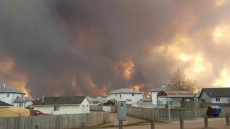TORONTO — Several Canadian media groups will try to intervene in an appeal of a judge's order that a news outlet give the RCMP background materials related to interviews with an accused terrorist, their lawyer said Thursday.
The application to intervene, which requires court approval to proceed, will likely be filed in the summer once Vice Media has filed its appeal documents, Andrea Gonsalves said.
Judges have to understand the damaging impact the ruling could have on the vital role media play in a democratic Canada, she said.
"That role is in jeopardy if the media themselves and the courts don't do everything they can to protect their freedoms, their independence," Gonsalves said.
"Courts and judges need to hear from affected parties to understand the potential implications of their decisions."
In a case that has alarmed several media groups, RCMP obtained a court order for Vice Media to hand over records related to stories on Farah Shirdon written by journalist Ben Makuch.
RCMP have charged the Toronto-born Shirdon, 22, in absentia with several offences, including leaving Canada to participate in the activity of a terrorist group, taking part in the activity of the Islamic State terrorist group, and threatening Canada and the U.S.
Recently released court records show RCMP admit that a news outlet known for handing over sensitive materials to police would likely run into roadblocks when it comes to interviewing suspected terrorists.
"It is a reasonable inference that this news organization would not be able to stage this kind of interview with a purported member of a terrorist group if they had a reputation for immediately handing original evidence to the police," Const. Harinder Grewal states.
Media lawyer Iain MacKinnon, who represents Vice, called the admission noteworthy because news organizations have often been forced to try to prove co-operation with authorities would hamper their ability to do their work.
Grewal also states the RCMP did not ask Vice or Makuch to hand over the records voluntarily out of fear they would hide them.

"There is a risk that once alerted to law-enforcement interest in the material, they could act to put the information in electronic or physical storage in some location that is beyond the reach of Canadian court process," he says.
In the production order, which Vice is fighting, RCMP wants all notes and records of communications related to how the news outlet and any of its journalists made contact with Shirdon, who has used several aliases on social media and who has made threats against Canada.
The order — only parts of which can be published — also asks for paper printouts, screen captures or any other computer records of "all communications between Makuch or any employee of Vice Media Canada" and Shirdon via the Kik instant messenger application. Police say the material is crucial to their ongoing investigation against him.
Numerous media groups expressed alarm after Ontario Superior Court Justice Ian MacDonnell ruled in March that Makuch must hand over the materials.
"This ruling sets a dangerous precedent and deals a blow to press freedom and the integrity of journalism in Canada, forcing the essential investigative function of the press to be put at the disposal of law enforcement," the groups said in a statement.
The groups — including Reporters without Borders, the Canadian Association of Journalists, Canadian Journalists for Free Expression and National NewsMedia Council — said MacDonnell had "undermined" media freedom.



